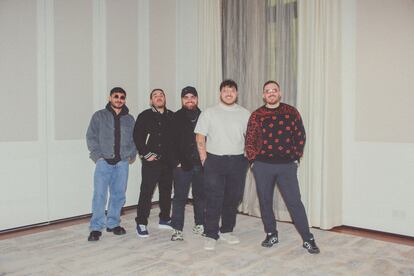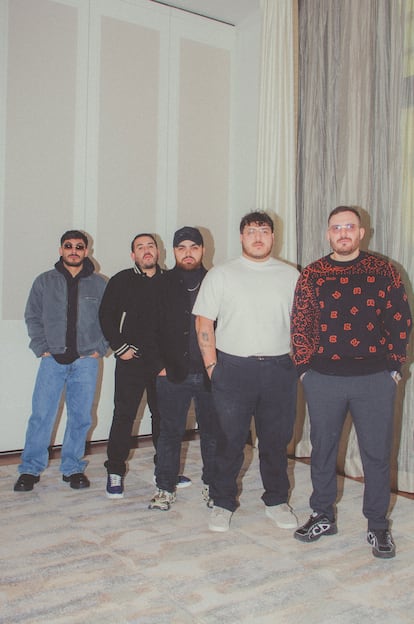Grupo Frontera: ‘We respect American laws, but we support Mexican immigrants as best we can’
The successful band from Texas went from getting together on weekends to winning a Latin Grammy and collaborating with artists such as Shakira and Bad Bunny

It’s a rainy Monday in Madrid. Grupo Frontera — a Mexican-American band — is meeting EL PAÍS at a luxurious hotel in the Spanish capital. When they enter the room, they introduce themselves one by one, yawning.
There are five band members: Carlos Guerrero, Juan Javier Cantú, Alberto Acosta (known as “Beto”), Julián Peña Jr. and Adelaido Solís (known as “Payo”). They’re tired and jetlagged after a 10-hour-long flight from the United States. You can see dark circles under their eyes.
However, they’re constantly joking around and teasing each other. They should be on vacation, but their manager suggested they come to Spain, and they didn’t think twice.
Before the interview, they were preparing for their concert at the Starlite Theater. And, before they left the United States, they won the Latin Grammy for Best Norteña Album. Three years ago, had you described to them what they’re currently experiencing, they wouldn’t have believed it.
Back in 2022, they started out as a group of friends making Mexican regional music. Their version of No Se Va, by Colombian band Morat catapulted them to success on social media, especially on TikTok. After that, they released their first album: El Comienzo (“The Beginning”). This featured one of their first big collaborations: un x100to with Bad Bunny. A defining moment, the song now has more than one billion plays on Spotify. They’ve now released their second album — Jugando a Que No Pasa Nada (“Pretending That Nothing’s Wrong”) — and 35 million people listen to them every month on the streaming platform.
Although they perform regional music, their outfits resemble those typically worn by rappers: Prada or Balenciaga, oversized t-shirts, and baggy pants. They’re a meeting point between the old and the new. They play traditional music, certainly, but they collaborate with artists such as Shakira, Peso Pluma and Arcángel. They also find themselves in a clash of two realities: they’re American citizens, but they all have a connection with Mexico. They come from the border between the two countries, hence their name. They’re what’s known as “Tex-Mex.” While they’re culturally more Mexican, they also reside in the United States. “When we named our band Grupo Frontera, we didn’t think about that: we just chose ‘frontera’ because we felt like it. We constantly going back and forth on the name,” explains Juan Javier, the band’s second lead vocalist.
“We still can’t believe everything that’s happening to us. We got together thinking that we were going to play at weddings,” Adelaido Solís jokes, as they sit down to begin the interview. Alberto Acosta is practically asleep, with his neck tilted downwards.
Question. As a band, you’ve had a meteoric rise. At what point did this become something serious?
Answer. We still see ourselves as a bunch of friends who wanted to form a band and play our own music. We realized that we could make a living from this after the song No Se Va came out, two or three months after we got together. People — as well as several record companies — started seeking us out. That’s when we realized what we could do with our lives.
Q. You just won the first Latin Grammy for Best Norteño Album and Best Regional Mexican Song. How have you processed this?
A. We still can’t believe that we just won a Grammy — our first Grammy — and, hopefully, one of many. It’s something really cool, we didn’t think we would get to this point.
Q. You maintain the essence of traditional Mexican music, yet you also collaborate with the biggest reggaeton stars. Why do they want to work with you?
A. When we started, everybody was listening to No Se Va. Afterwards, our friend, [Mexican guitarist] Carin León, helped us out. There were many bands that wanted to collaborate with us. Cumbia norteña or urban music was what worked best at that time. I feel that everyone wanted to hop on the bandwagon. Even though our music was familiar to us, many artists thought it was something new.
Q. You’ve collaborated with Shakira, Peso Pluma, Nicki Nicole, Bad Bunny… who’s your favorite?
A. [The band members look at each other and answer at the same time:] Bad Bunny. Without a doubt.
[Juán Javier]: Bad Bunny is the most special, because [working with him] was something that I feel was a turning point in our career. It was the leap to becoming international.
Q. Would you like to collaborate with any artists from Spain?
A. We really like Rels B. Also C. Tangana. With Alejandro Sanz, there’s something coming soon — we can already anticipate that — but that’s salsa, not cumbia.
Q. You often say that part of your success comes from collaborating, being creative and working as a collective. This is unusual today, when it seems that there are more and more individual artists, rather than bands. What’s your creative process like?
A. [Julián]: Our producer — Edgar Barrera — gets involved with us to write and produce. But when it comes to music, he sends us a demo of the song. If we like it and say “ok,” Beto adds his style on the guitar, Juan on the accordion, Carlos on the drums, Payo gives his points when it comes to mixing the music. When we get into the instrument everyone knows what to do, but it has always flowed well. We like to record live, all together at the same time.
Q. You compose very cheerful rhythms, but the lyrics are usually sad, about heartbreak. Do you like to play with that contradiction?
A. [Payo:] It’s something we’ve done from the beginning, really. Our genre isn’t new. We play it and we give it a different, more personal touch, with our instruments and our own flow, so to speak. But it’s not a new style. Cumbia is danceable, but the lyrics are sad. We do the same thing, but with modern lyrics. In other words, the new generation — the younger folks — can also feel those sad lyrics, but with a dance vibe.
Q. In fact, there’s a specific lyric — “My Instagram felt more like yours than mine” — in your song Ay Mamá. Is that what you mean?
A. Yes, totally. Since No Se Va came out, we started to focus on that. Again, the big change is also in our song x100to, where we wanted to use very current lyrics. We sing: “I have 1% of battery left on my cell phone and I want to talk to you.”
[Julián:] In the past, in the songs that our parents listened to, we heard about sending love letters. Now, we send a DM. As artists, we have to adapt to this change, in order for people to identify [with our songs].
Q. You talk a lot about feelings in general. Is it important for you to do that, as men? Even more so now, when there’s so much talk about new masculinities.
A. Men also cry. It’s okay. Many artists touch on this subject, like Peso Pluma, Gavito, Fuerza Regida… their songs also touch on a man’s feelings. And how he feels about someone he loves leaving him, when he loves someone and that love isn’t reciprocated. Music talks a lot about feelings.

Q. In Spain, musicians are returning to their roots. The most mainstream artists may be Rosalía and C. Tangana, but this phenomenon is happening around the country. It’s also happening in Latin America, when you listen to the albums put out by many artists. Why do you think this is the case?
A. All artists reclaim their roots, but with their personal touch. Rauw Alejandro just did it. That’s the cool thing about music. Before, someone made reggaeton and everyone made the same kind of beat. Now, everyone brings their own flavor. All genres are becoming very modern. All artists have roots and we like to reclaim our culture and show [our audience] where this new concept came from. Now, for example, we can connect the culture of regional Mexican music with Puerto Rican music.
Q. In contrast to your lyrics, Mexican corridos — or narrative ballads — are very popular. There’s a lot of talk about violence, money, weapons… what do you think about that? And why don’t you touch on these issues?
A. Dude, corridos have always existed. They tell a story. For Mexicans, they’re like rap. They have their storytelling element. But lately, there’s been a change, in that corridos can talk about parties, love and other topics.
Q. Despite these new forms of corridos that you mention, traditional ones are still being made. Peso Pluma, for instance, has been banned in the Mexican state of Chihuahua. Former Mexican president López Obrador has said that he prefers that music not be censored… but what do you think?
A. [Beto]: We’ve grown up with them and it’s part of our culture… but there are things that are acceptable and others that are not. There are certain states in Mexico that don’t accept them, but at the end of the day, many corridos are stories about fictional people.
[Julián]: Today’s corridos are new. They have a new style, but it’s something that has always existed. Our parents listened to them when we were little. It’s the music that you would listen to when you grilled your meat and opened the bottle of tequila.
Q. So, it’s even more strange that the authorities want to censor them.
A. Well, there are corridos that incite and talk a lot about violence. Some are very powerful. If they reach small children, there are things [in the lyrics] that can be harsh… but not all of them are like that.
Q. Tell me more about your connection with Mexico.
A. [Payo]: We live five minutes from the border, in the Rio Grande Valley. We always say that the Valley isn’t Mexico because it’s on the American side… but all of us who are here have a relationship with the country, whether through family, friends, work...
I swear that 95% of us speak more Spanish than English. Our lives are half and half. I went to school in the United States, so I was in the US during the week and in Mexico on the weekends. And not just me, everyone I grew up with.
Q. In the United States, Trump has just been re-elected as president. His proposals regarding the border with Mexico have been very controversial, going as far as wanting to put up a wall. As border dwellers, how do you see this issue?
A. [Juan Javier]: We rarely get involved in politics. It’s very controversial for us and we just want to make music. But we’ve always supported immigrants. Last year, we went to visit a [community] center: we donated toys for the children. It’s our neighborhood, after all.
[Beto]: We respect the laws that the country has, but we support immigrants as best we can. We do things for the community. We donate toys for the children of the migrants who are there and who are being detained [by the authorities].
Q. From what I understand, you don’t agree with the idea of a border wall.
A. [Beto]: No… but at the end of the day, there’s no wall.
[Julián]: Yes, there is, but only halfway. They never finished it. And that’s where we live. As Bill Burr — the American comedian — said: “at the end of the day, whoever’s president isn’t going to put food on your table.” So… keep going, guys!
Q. Since 2023, February 16 has been declared “Grupo Frontera Day” in Edinburg, Texas. What’s that like?
A. It’s cool, but we’ve forgotten about it! [laughs]. They don’t have a party or anything. They gave us the key to the city… we asked what it opened and they told us: “nothing.” So, like, what’s the benefit of having a day?
Q. You formed the band just over two years ago. Where do you see yourselves in another two years?
A. We hope to be even more international. To be listened to more in Europe. Cumbia has never been global… maybe now, a little more. We love being able to expand it.
[Juan Javier]: And Brazil! It’s a Latin American goal.
Q. Do you want to mention anything else?
A. [Beto]: I want to offer a public apology. I’ve never traveled for so long and I fell asleep [during the interview]. [The flight to Europe] was about 10 hours and, because of jet lag, I’m falling asleep. Sorry.
Sign up for our weekly newsletter to get more English-language news coverage from EL PAÍS USA Edition
Tu suscripción se está usando en otro dispositivo
¿Quieres añadir otro usuario a tu suscripción?
Si continúas leyendo en este dispositivo, no se podrá leer en el otro.
FlechaTu suscripción se está usando en otro dispositivo y solo puedes acceder a EL PAÍS desde un dispositivo a la vez.
Si quieres compartir tu cuenta, cambia tu suscripción a la modalidad Premium, así podrás añadir otro usuario. Cada uno accederá con su propia cuenta de email, lo que os permitirá personalizar vuestra experiencia en EL PAÍS.
¿Tienes una suscripción de empresa? Accede aquí para contratar más cuentas.
En el caso de no saber quién está usando tu cuenta, te recomendamos cambiar tu contraseña aquí.
Si decides continuar compartiendo tu cuenta, este mensaje se mostrará en tu dispositivo y en el de la otra persona que está usando tu cuenta de forma indefinida, afectando a tu experiencia de lectura. Puedes consultar aquí los términos y condiciones de la suscripción digital.









































